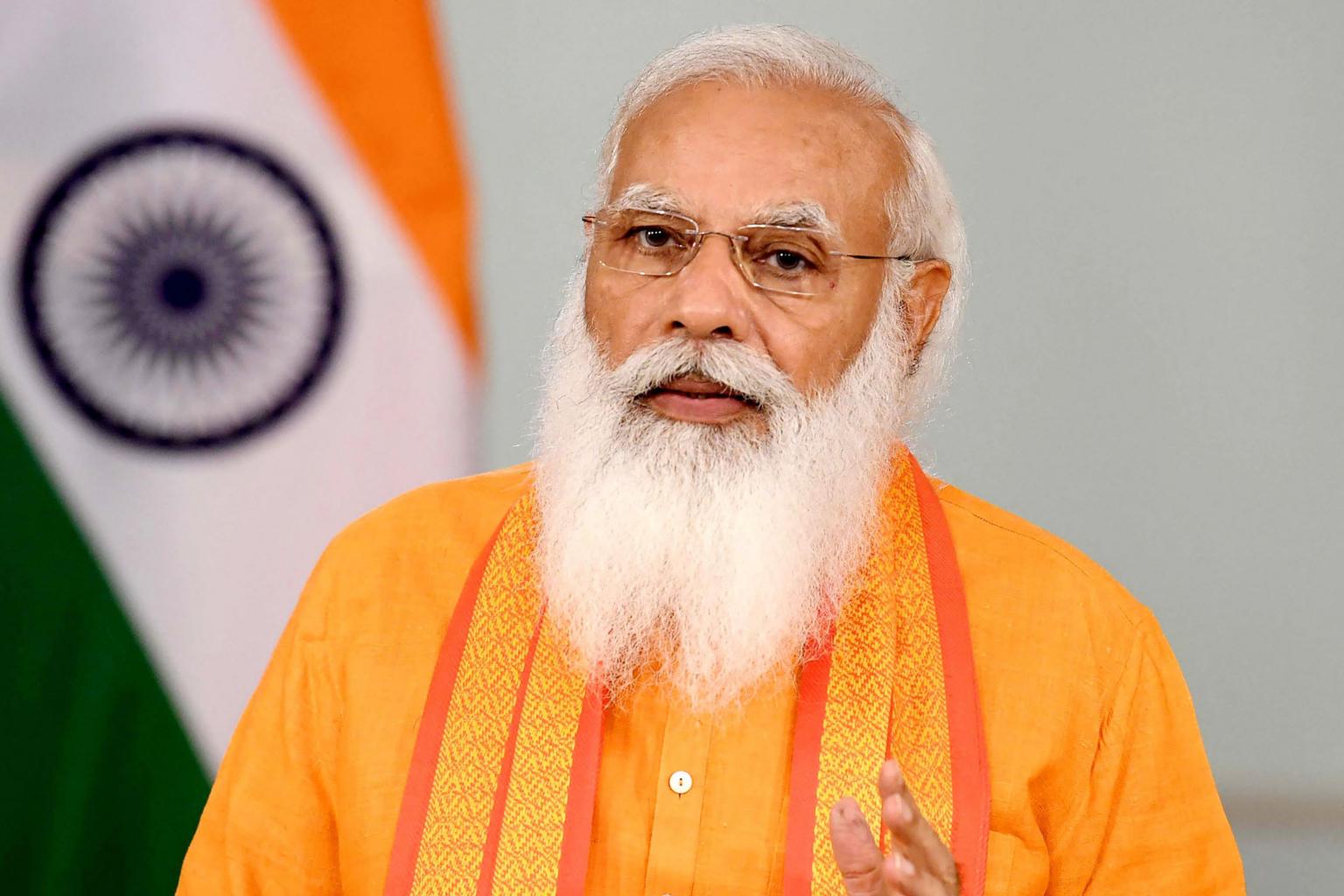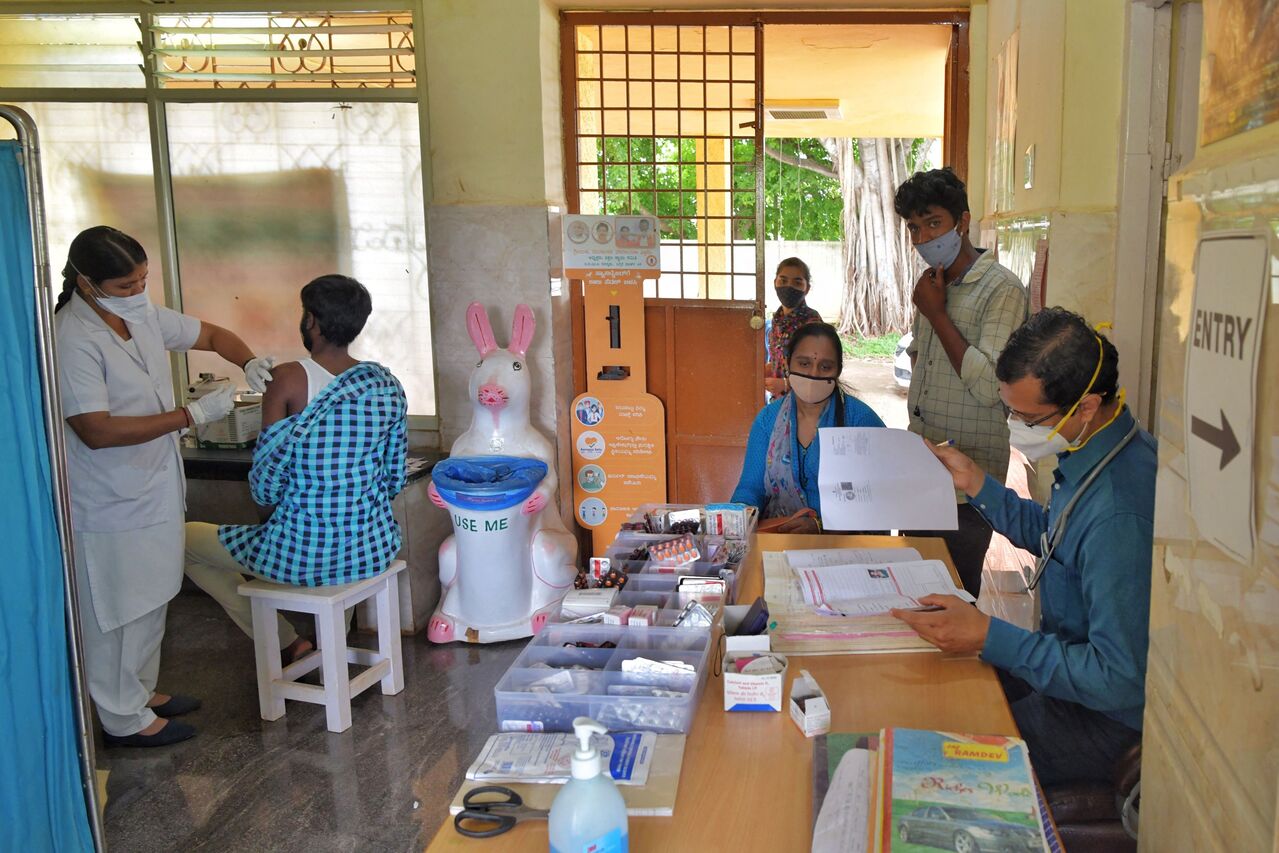News analysis
Modi's Cabinet reshuffle seen as a course correction and a reset
Sign up now: Get ST's newsletters delivered to your inbox

Indian Prime Minister Narendra Modi overhauled his Cabinet on July 7, 2021.
PHOTO: AFP/INDIAN PRESS INFORMATION BUREAU
Follow topic:
NEW DELHI - Prime Minister Narendra Modi's major cabinet reshuffle is being seen as a course correction amid criticism of the government's handling of the Covid-19 pandemic as well as a political reset ahead of crucial state elections.
Health Minister Harsh Vardhan, who prematurely declared the "end game" of Covid-19 was in sight ahead of a devastating second wave in the country earlier this year, was the most high profile exit.
Other major casualties included the Minister for Electronics and Information Technology Ravi Shankar Prasad, who was at the forefront of an ongoing row with social media giant Twitter over new IT rules, and Minister for Information and Broadcasting Prakash Javadekar, a senior spokesman of the ruling party.
They were among a dozen ministers who resigned on Wednesday (July 7) as 36 new faces were inducted into the expanded Cabinet, which grew from 52 to 77 members.
Mr Jyotiraditya Scindia, who took over as civil aviation minister, a post his late father held decades ago, was among the high profile new entrants.
Mr Prasad's successor, Ms Ashwini Vaishnaw, on Thursday told reporters that Twitter would have to abide by the new social media rules, indicating clearly that the government's position on the matter had not changed.
New Health and Family Welfare Minister Mansukh Laxman Mandaviya and his newly-minted deputy, Dr Bharati Pravin Pawar, who is Minister of State, have their work cut out in coordinating India's vaccination drive to prevent a third wave of infections.
While the pace of the vaccination programme has picked up in recent weeks, only around 4.7 per cent of the population has been fully vaccinated.
Like many other countries around the world, India has had to contend with vaccine shortages.
"Mr Modi has been on the back foot since April for the mishandling of the Covid-19 second wave, the vaccine policy, the loss of the (state election) in West Bengal, the economy and inflation," said columnist and political commentator Neerja Chowdhury.
"The international media took him to task. He saw the writing on the wall and tried to do a course correction," she added.
"He (Modi) has shifted gears halfway through his (second) term. He has brought in people he is more comfortable with from technocrats to bureaucrats and educators. It's a new look Cabinet. It is also a message to others to stay on their toes."

<p>A doctor (R) checks health reports of a patient while a health worker inoculates a person with a dose of the Covishield vaccine against the Covid-19 coronavirus disease at the Kanaswadi Public Health Centre (PHC) on the outskirts of Bangalore on July 7, 2021. (Photo by Manjunath Kiran / AFP)</p>
PHOTO: AFP
There is little doubt the Cabinet reshuffle was also fuelled by political considerations.
In India, such exercises take into account political representation for castes, regions and allies.
Ruling parties use Cabinet berths to reach out to important political groups and allies.
The new Health Minister, for instance, belongs to the Patidars, an important community in Gujarat, Mr Modi's home state, which is going to the polls next year.
Some 15 ministers in the Cabinet now hail from Uttar Pradesh where the Prime Minister's Bharatiya Janata Party (BJP) is fighting to retain power in crucial elections that are also due next year.
In a nod to the growing importance of women voters, seven female politicians, including Ms Anupriya Patel, who is the head of Apna Dal, a Uttar Pradesh based party and ally of the BJP, were brought into the Cabinet taking their total number in government to 11.
Dr Sandeep Shastri, vice-chancellor of Jagran Lakecity University, said that Mr Modi had undertaken a very complex exercise and consolidated ministries for the smoother running of government.
Mr Dharmendra Pradhan, for instance, has been put in charge of both the education and skills development ministries, each of which were under different ministers previously.
"There is no one single factor behind the reshuffle. It is a move for political accommodation, social engineering and regional representation... Those who were non-performing and had no political mass base have been let go," he said.
"It will definitely help deal with criticism but I'm not sure a rejig of portfolios alone will work. There needs to be something more substantive."
Ms Chowdhury said: "Everything hinges on how they will perform."
Looking ahead, the government will have to steer India out of the pandemic and push economic growth along with employment rates.
"Brand Modi is being repackaged," said journalist and author Rasheed Kidwai.

